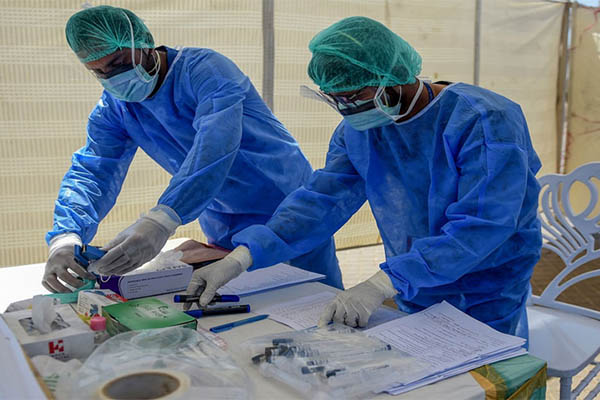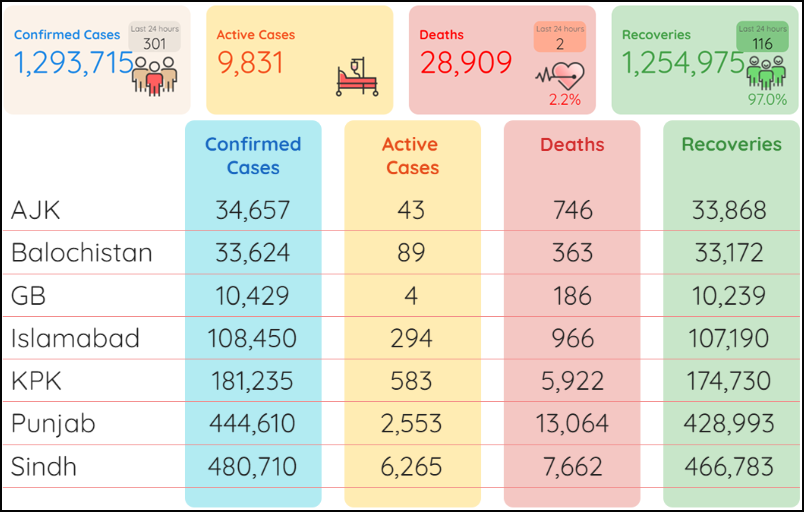
Courtesy PID
Confirmed infections of COVID-19 reach 1,293,715, against 1,254,975 recoveries and 28,909 deaths, leaving 9,831 active cases
Pakistan on Monday reported 301 new infections of COVID-19 after conducting 44,129 tests—a positivity ratio of 0.68 percent.
Islamabad’s National Institute of Health on Sunday confirmed that a male patient with no prior international travel history had tested positive for the Omicron variant of the coronavirus. Health authorities said they had already traced 10 contacts of the patient and they had been isolated pending tests to determine if they had also been infected. Separately, all 12 suspected Omicron cases from Balochistan have tested negative for the variant, with their genomic sequencing merely verifying their COVID-19 infection.
Confirmed Cases, Total – 1,293,715 (Tests: 23,189,338)
Punjab – 444,610
Sindh – 480,710
Balochistan – 33,624
Khyber–Pakhtunkhwa – 181,235
Islamabad – 108,450
Gilgit-Baltistan – 10,429
Pakistan-administered Kashmir – 34,657
Deaths – 28,909
Recoveries – 1,254,975
In the 24 hours preceding 8 a.m., Monday, Pakistan’s confirmed cases climbed to 1,293,715. Meanwhile, deaths increased by 2 to 28,909. At the same time, recoveries increased by 116 to 1,254,975, or 97 percent of total infections. There are currently 9,831 active cases of COVID-19 in the country, with the NCOC saying 625 of them require critical care.

Punjab
On Monday, authorities reported 1 death due to the coronavirus, raising total casualties to 13,064. The province now has 444,610 confirmed cases; it reported 57 new infections after administering 17,238 tests, a positivity ratio of 0.33 percent. There were 36 new recoveries recorded, leaving 428,993 fully recovered, and 2,553 active cases of the virus.
Sindh
Confirmed cases of the novel coronavirus in Sindh have now climbed to 480,710; it reported 185 new infections on Monday after conducting 12,205 tests, a positivity ratio of 1.5 percent. The province reported 1 death and 20 recoveries, raising toll to 7,662 and total recovered to 466,783. Overall, the province now has 6,265 active cases of the novel coronavirus.
Khyber-Pakhtunkhwa
The provincial government on Monday reported 31 new cases after administering 10,017 tests, a positivity ratio of 0.31 percent. Overall, Khyber-Pakhtunkhwa’s confirmed cases have climbed to 181,235. It recorded no new deaths and 52 recoveries, maintaining toll at 5,922 and raising recoveries to 174,730. There are currently 583 active cases of COVID-19 in the province.
Balochistan
The province on Monday maintained its total confirmed cases at 33,624, reporting no new infections after conducting 382 tests. There were no deaths and 4 recoveries reported in the past 24 hours, leaving 363 fatalities and 33,172 fully recovered. There are now 89 active cases of COVID-19 in the province.
Federal Areas
Islamabad on Monday maintained its confirmed coronavirus cases at 108,450, reporting no new cases after conducting 3,598 tests. There were no deaths or recoveries recorded in the past 24 hours, leaving 966 casualties; 107,190 recovered; and 294 active cases.
Gilgit-Baltistan reported no new cases of coronavirus on Monday after conducting 387 tests; it currently has 10,429 confirmed cases. There were no deaths and 1 recovery reported in the past 24 hours, leaving 186 fatalities; 10,239 fully recovered people; and 4 active cases of COVID-19.
Pakistan-administered Kashmir reported 2 new cases of COVID-19 after administering 302 tests, a positivity ratio of 0.66 percent. There were no deaths and 3 recoveries in the past 24 hours, leaving 746 fatalities and 33,868 fully recovered. It now has 43 active cases of COVID-19.
Across the world
Globally, the virus has now infected more than 280,338,595 people, with over 5,416,734 reported deaths. After having passed through multiple waves of the pandemic, the world is divided between countries that are struggling to counter mutated variants, or have introduced vaccination boosters to maintain normalcy. There are mounting calls, especially from the World Health Organization, for “vaccine equality,” i.e. for developed nations to stop hoarding vaccines in excess of their requirements and to share them with the developing world to help prevent the mutation of new variants. Overall, around 250,368,948 patients of the 280.3 million+ infected have recovered thus far.
